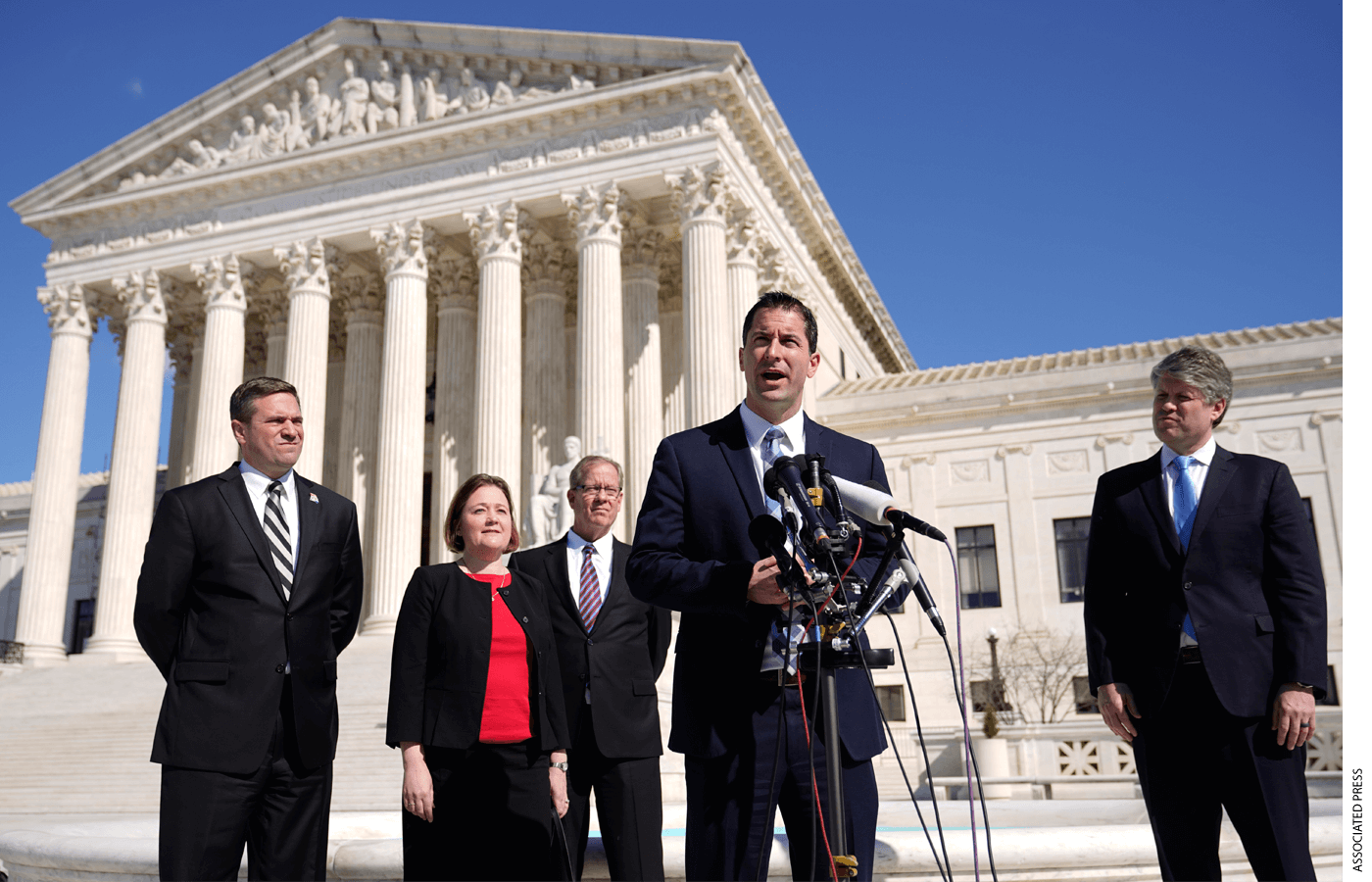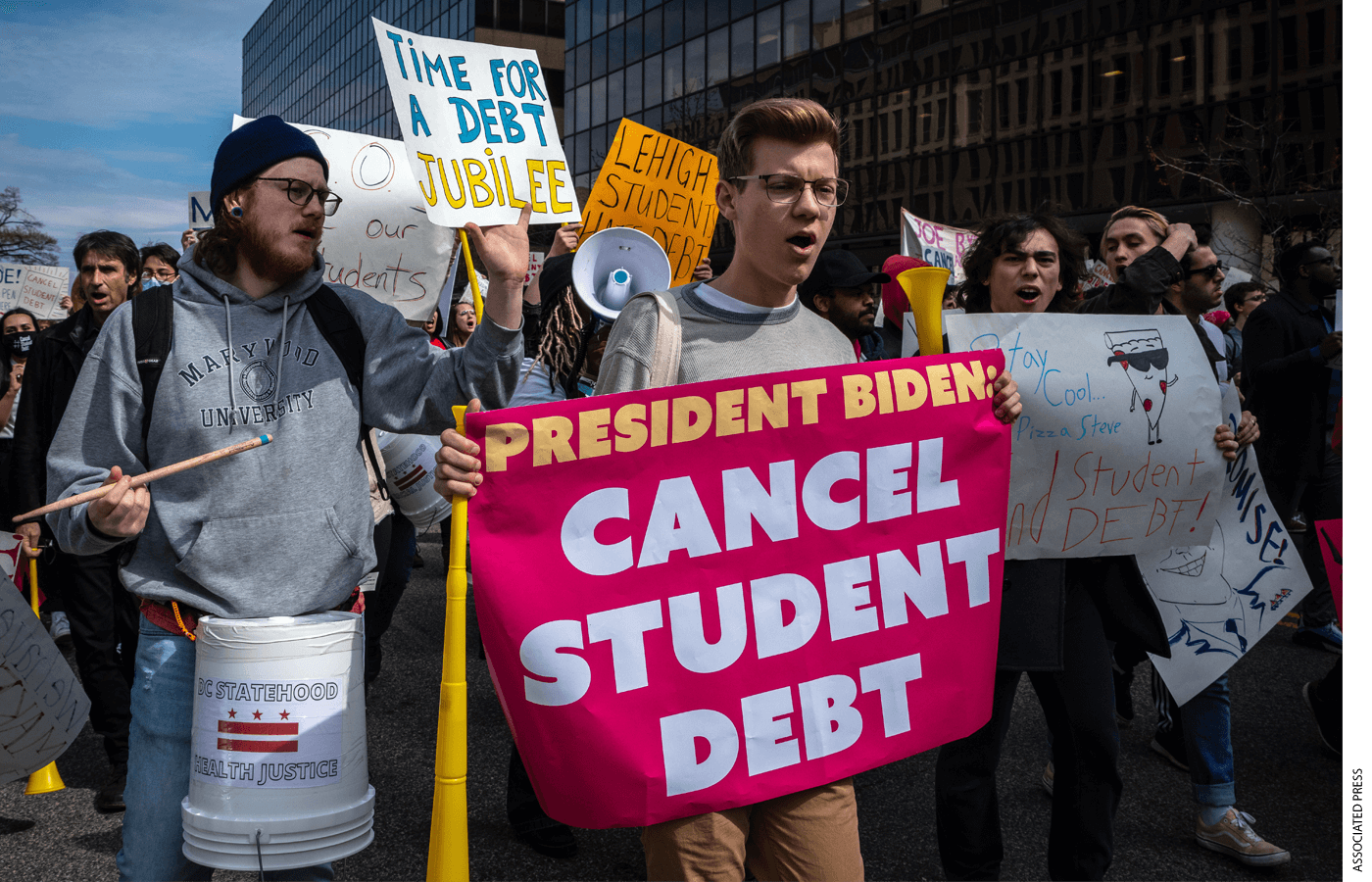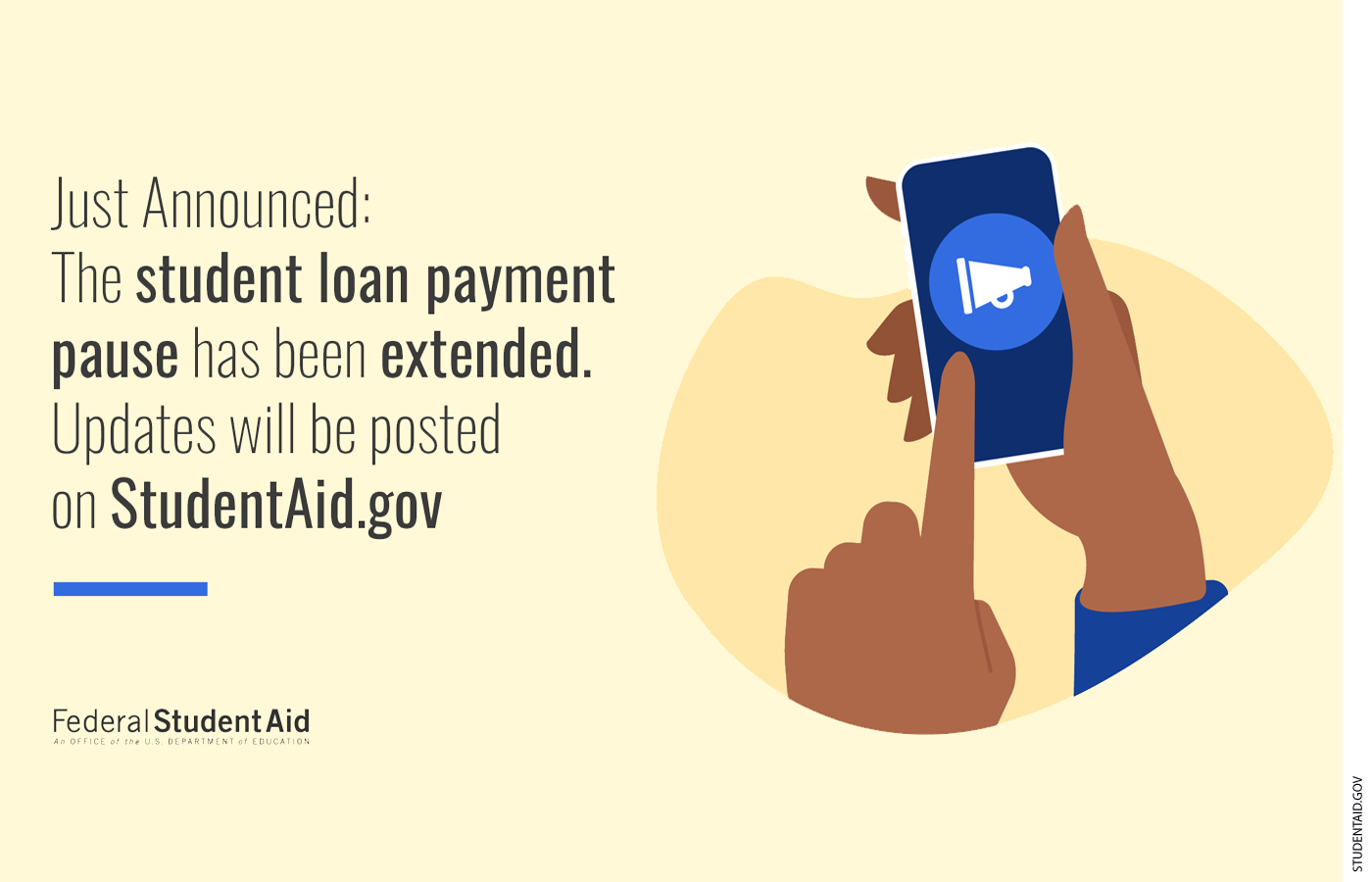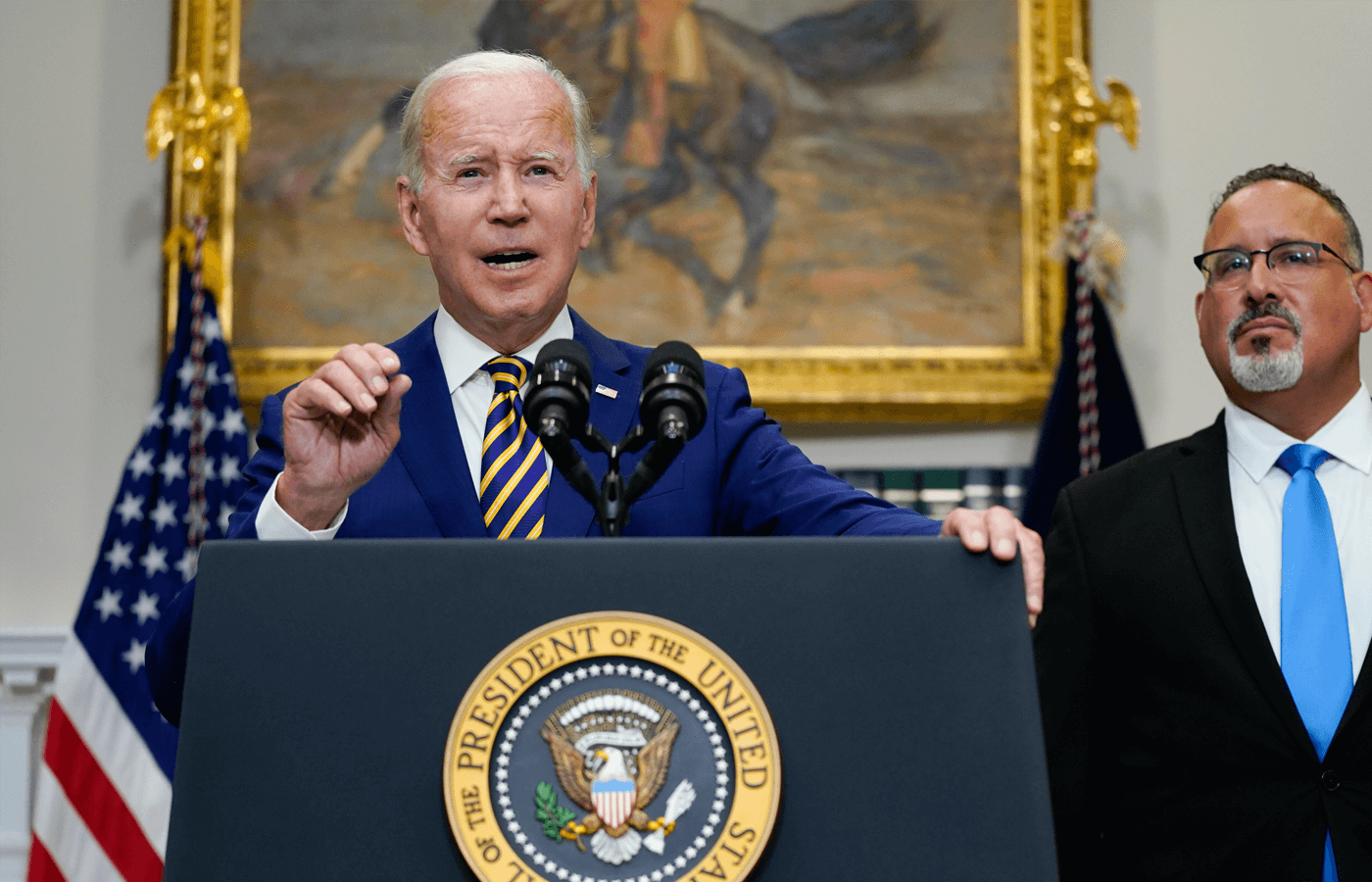
The 20th century witnessed an astonishing growth in presidential power, leading some to contend that the office had become “imperial,” dominating other branches of government. President Biden’s decision in 2022 to forgive more than $350 billion in student loan debt—an action taken on the basis of statutory authority that was, at best, unclear—gave critics of the imperial presidency another reason to worry.
During the 2020 presidential campaign, Biden promised to waive up to $10,000 in federal student-loan debt. When he did so in August of 2022, the amount increased to $20,000 for Pell Grant recipients but was limited to $10,000 for all others. To qualify, in either 2020 or 2021 the adjusted gross income for individuals had to be less than $125,000 and for married couples less than $250,000. The legal authority on which Biden relied to justify the action was the Higher Education Relief Opportunities for Students Act of 2003, also known as the HEROES Act. The Act, which was passed in the wake of the September 11, 2001, terrorist attacks, allows the Secretary of Education to “waive or modify any statutory or regulatory provision . . . as may be necessary to ensure that” borrowers affected by a national emergency “are not placed in a worse position financially.” It defined the individuals who could qualify for relief as those serving on active duty or in the national guard during a war or other military operation, those living or working or is employed in an area that is declared a disaster area by a federal, state or local government, or those who have “suffered direct economic hardship as a direct result of a war or other military operation or national emergency.”
Previously, in response to the Covid-19 pandemic, the Trump administration had suspended student loan repayments, a policy Biden continued while unsuccessfully seeking Congressional passage of loan forgiveness. Indeed, prior to Biden’s action, it was difficult to find many people who thought the president had the authority to cancel debt unilaterally without a new act of Congress. For instance, in July of 2021, when asked about student loan forgiveness, Speaker of the House Nancy Pelosi said, “The president can’t do it. So that’s not even a discussion. Not everybody realizes that. But the president can only postpone, delay, but not forgive.” The “discussion” that nonetheless ensued ultimately led to oral argument before the Supreme Court February 28, 2023, in two cases, Biden v. Nebraska and Department of Education v. Brown, that challenged the Biden administration’s decision.
The first was brought by six Republican state attorneys general. They contended that Biden had exceeded his authority under the HEROES Act and that the plan was created in violation of rulemaking procedures that federal agencies are supposed to follow. A federal district court judge, Henry Autrey, initially dismissed the case, saying that states lacked standing to sue. But a three-judge appellate panel in the 8th Circuit overturned that decision and granted an emergency injunction pausing the program. The Supreme Court then accepted a Biden Administration request to hear the case on expedited schedule.
The second case was brought by two student-loan borrowers. Myra Brown did not qualify for relief under the program because her loans were held by commercial lenders. Alexander Taylor did not qualify for $20,000 of relief because he did not receive Pell Grants. Both argued that it was “irrational, arbitrary, and unfair” for their debt to not be forgiven too. A district court judge, Mark Pittman, ruled that the program was unlawful. When the 5th Circuit Court of Appeals refused to pause that ruling, the Supreme Court agreed to hear the case on an expedited schedule as well.
At oral argument, the justices spent significant time discussing whether the states or the students had standing. The best hope for the Biden Administration to prevail would be for some of the court’s conservatives to join with the liberal bloc to declare that none of the plaintiffs had a right to sue. For plaintiffs to have standing, they must show a “concrete harm” or “injury in fact.” Some of the conservative justices, such as Justice Barrett, appeared sympathetic to the claims that some of the plaintiffs could not meet that standard. But overall, the justices seemed skeptical about accepting the consequences of adopting that position. Chief Justice Roberts captured that skepticism when he said to Solicitor General Elizabeth Prelogar, who was defending the policy for the Biden Administration, that her view means “that the President can act unilaterally” and therefore “there was no role for Congress to play in this either, and at least in this case, given your view of standing, there’s no role for us to play in this — in this either.” This outcome seemed antithetical to principles of separation of powers and the ability of each branch of government to check abuses of power by the others to Roberts. As well, Prelogar acknowledged under questioning by Justice Alito that as long as the court finds that any party in either of the cases has standing that the court could decide both cases on the merits. Since standing doctrine is relatively flexible, it seems likely that the court will decide that at least one of the two students or one of the six states does in fact have standing.
If the court’s conservatives do reach the merits, enough of the justices appeared unconvinced that Biden had sufficient legal authority for his action to make betting on the program’s survival unwise. Most importantly, there seemed to be a consensus that at the least the policy should fall under the major questions doctrine. Just last term, the court used that doctrine to strike down the Environmental Protection Agency’s Clean Power Plan in West Virginia v. EPA. The doctrine says that if an agency wants to decide an issue of extraordinary economic or political significance, the agency must be able to point to Congressional authorization that is clear and specific rather than merely vague. Even Justice Sotomayor said that the significant sum involved in forgiving the loans “seems to favor the argument that this is a major question.” Prelogar tried to argue that the doctrine should only apply to exercises of regulatory authority by an agency while this was merely a “benefits program” which allegedly has a lower threshold of “liberty interests” for citizens. That distinction did not seem to gain any traction.
Justice Thomas pointed to another concern. Canceling the debt was “in effect . . . a grant of $400 billion,” he noted, which seemed to him to run “head long into Congress’s appropriations authority.” Other justices seemed skeptical that even if the program could be created that it could be done so outside of normal notice-and-comment rulemaking where the public has an opportunity to weigh in on the effects of the decision. Prelogar argued that Congress had exempted the HEROES Act from those requirements, but Justice Kavanaugh seemed to think that outside of ordinary rulemaking it would be impossible for the Secretary of Education to factor in all the “big winners and big losers” created by loan forgiveness.
Those “winners and losers” also troubled Chief Justice Roberts, who raised questions about the fairness of the program. Some people might have worked hard during college to avoid taking out loans while others did not, but only the latter would rewarded. Roberts also mentioned a hypothetical landscape-business owner who didn’t go to college but who borrowed money to start a business. His debt was not forgiven, and his tax dollars were spent to subsidize the college graduates. At one point, the chief referred to the loan forgiveness as a “half trillion” dollar action. To Roberts this reinforced that this kind of decision should be left to Congress, since “we like to usually leave situations of that sort, when you’re talking about spending the government’s money, which is the taxpayers’ money, to the people in charge of the money, which is Congress.”
Overall, the broad concerns about executive power likely point to a loss for the Biden Administration. Justice Kavanaugh, for instance, said that “some of the biggest mistakes in the Court’s history were deferring to assertions of executive emergency power” while “some of the finest moments in the Court’s history were pushing back against presidential assertions of emergency power.” One could even imagine a majority agreeing that the policy was unlawful but not agreeing on the reasons why, which would still mean a defeat for the Biden Administration.
The administration tried to turn the focus back to the beneficiaries of the debt relief, with Secretary of Education Cardona issuing a post-argument statement about “the crushing burden of student debt for millions of working families.” The court may tell those families, essentially, that if they want loan forgiveness, they will need not only to elect a sympathetic president such as Biden, but also to install a Congress that is willing to authorize the expenditure in a more explicit way than was done by the HEROES Act of 2003. Those concerned about the imperial presidency would welcome that result.
Joshua Dunn is professor of political science and director of the Center for the Study of Government and the Individual at the University of Colorado Colorado Springs.
This article appeared in the Summer 2023 issue of Education Next. Suggested citation format:
Dunn, J. (2023). The Imperial Presidency Meets Student Debt: Supreme Court skeptical of Biden’s unilateral loan forgiveness. Education Next, 23(3), 6-7.





